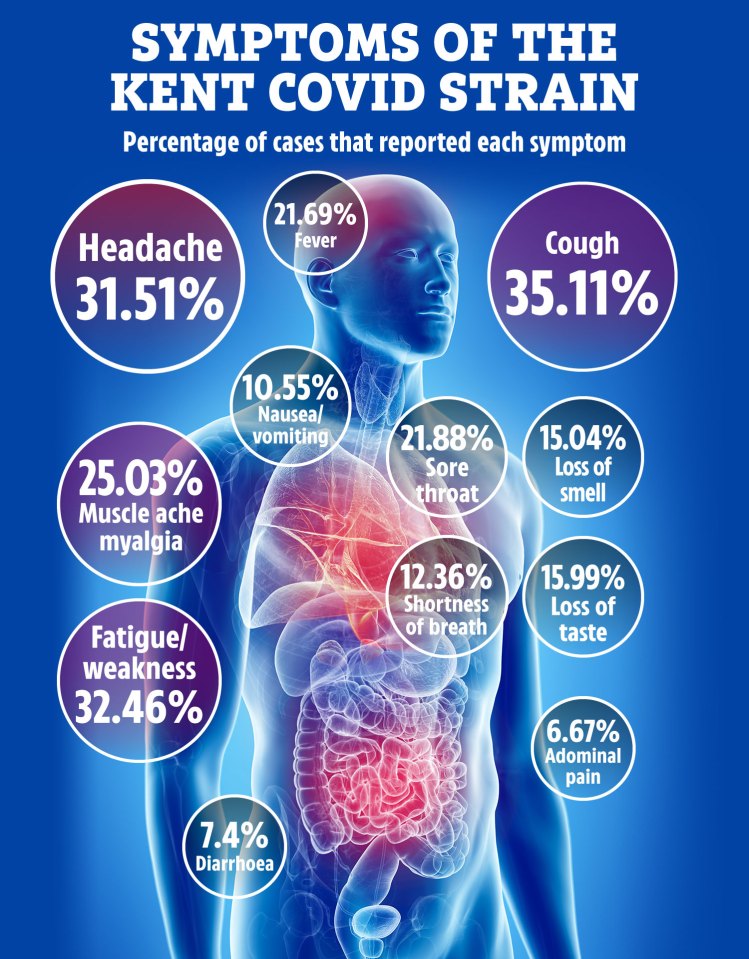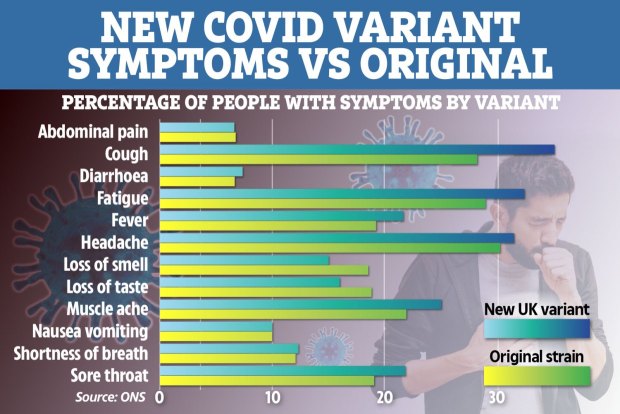Kent strain symptoms explained

THE Kent Covid variant has swiftly become the most dominant in parts of the UK, having emerged only a few months ago.
The more contagious and potentially more deadly strain has different symptoms to look out for, early data suggests.
🦠 Read our coronavirus live blog for the latest news & updates
Generally, the signs of Covid remain the same. However, data shows the most common symptoms of the Kent strain differ from other variants prominent in the UK.
The Office for National Statistics - which tracks the outbreak by swabbing thousands of people in the UK every week - recently published a report into the characteristics of the Kent strain.
The preliminary findings were based on the swab tests of people in private households in England between November 15 to January 16, and their self-reported symptoms.
The most common symptom of the Kent variant, reported by 35 per cent of people who tested positive, was a cough.
The NHS describes the cough as "new and continuous".
Close behind was fatigue and muscle weakness, affecting 32 per cent of cases, and headache with 31 per cent.
Muscle aches were reported by a quarter of those testing positive for the Kent strain, followed by a sore throat (22 per cent) and fever (22 per cent).
A loss of taste or a loss of smell was reported by only 15 per cent of cases each.
HOW THIS COMPARES TO OLD STRAINS
In comparison, the symptoms most common in those testing positive for original coronavirus strains were a headache (30 per cent), fatigue and weakness (29 per cent), a cough (28 per cent) and muscle pain (22 per cent).
Loss of taste or smell was far more common in this group - each symptom was reported by 19 per cent of cases.
The ONS said the largest difference in symptoms between people with the new and old variants were for cough, reported in seven per cent more of those with the Kent strain.
People with this strain also reported a sore throat, fatigue, muscle pain and fever more often - by three per cent each.
ONS added: “There is no evidence of difference in the gastrointestinal symptoms, shortness of breath or headaches.”
The three official symptoms listed by the NHS for the original strain are a cough, fever and loss of taste or sense of smell.
But both the original and Kent variants appear to cause a fever in only 22 and 19 per cent, respectively.
Scientists have called for the official list of coronavirus symptoms to be altered to include signs such as headache and fatigue.
HIGHER CONTAGIOUSNESS
The ONS data also indicates people with the new variant were more likely to report having symptoms, as opposed to being “asymptomatic”.
Fifty-three per cent of people in England who tested positive with the Kent variant said they had Covid-19 symptoms compared to 48 per cent of people with other variants.
Scientists said this could explain why it is more easily spread, as infected people are coughing more.
Lawrence Young, virologist and professor of molecular oncology at the University of Warwick, said: “Mutations in the UK virus variant could influence the symptoms associated with infection.
“This variant is more transmissible and infected individuals appear to have higher virus loads which means they produce more virus.
“This could result in more widespread infection within the body perhaps accounting for more coughs, muscle pain and tiredness.”
He said the virus has 23 changes compared to the original Wuhan virus, some of which “could affect the body’s immune response and also influence the range of symptoms associated with infection”.
Prof Richard Tedder, Senior Research Investigator in Medical Virology, Imperial College London, said: “If there is an increased amount of coughing and perhaps sneezing associated with a particular variant virus, these two activities can markedly increase the amount of virus which is shed into the environment, thereby making it ‘more infectious’.
“The most important feature is to remain distant from other people and wear facial covering able to reduce shedding of sneeze- and cough-generated droplets when outside the home.”
Prof Tedder noted there is some lab research that show new variants have an enhanced ability to latch onto cells and infect them.
KENT STRAIN NOW MORE PREVALENT - AND IS MUTATING MORE
has revealed that in mid-January, the Kent variant was accounting for up to 90 per cent of coronavirus cases across England.
This compares with 28 per cent in the first week December.
The proportion of cases caused by the Kent strain has reached a possible high of 95-97 per cent in London, the East and South East.
The document has also revealed that the Kent strain has acquired a mutation similar to the South African variant - making it more likely to resist vaccines.
The mutation, known as E484K, is already present in both South African and Brazilian coronavirus variants.
It was previously thought this mutation was not present in the UK variant, also known as B.1.1.7.
But a recent report published by Public Health England said gene sequencing has shown that the E484K mutation has occurred spontaneously in 11 cases of the UK variant.
E484K has been described by scientists as worrying because it changes the shape of the virus's outer spike protein.
It means the antibodies produced by the immune system to fight the older version of the coronavirus may fail to recognise it in its new mutated form.
Laboratory studies have shown that antibodies are less able to bind to the spike protein, in order to stop it from entering cells.
Experts say the “worrying development” means vaccination and natural immunity will prove less effective against these strains if they are allowed to spread.
Up until now, studies have largely shown that vaccines will work against the Kent variant.
But there has been less positive news for mutations on the South African variant, containing the E484K mutation.
Dr Julian Tang, clinical virologist, University of Leicester, said it was a “worrying development, though not entirely unexpected”.
Most read in Health News
He said the E484K mutation is “now thought to be the main mutation impacting on vaccine efficacy”.
He explained that it could have happened because the two different variants of the coronavirus infected the same cell in a body - “but this is rare”, he said.
Read More on The Sun
Dr Tang said: “This is another reason to follow the COVID-19 restrictions/infection control measures more strictly - otherwise not only can the virus continue to spread, it can also evolve.
“Unfortunately, the lack of control of these different variants in the UK may lead this population to become a melting pot for different emerging SARS-COV-2/COVID-19 variants - so we really need to reduce our contact rates to reduce the opportunities for viral spread/replication to reduce the speed with which these different virus variants can evolve.”










